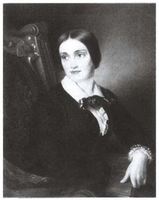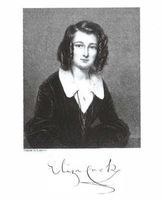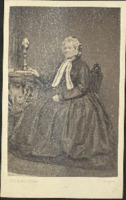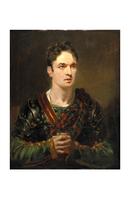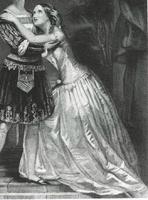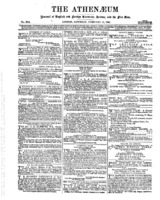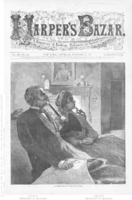"Charlotte Cushman's First Appearance in England," Harper's Bazaar, March 18, 1876
Dublin Core
Title
"Charlotte Cushman's First Appearance in England," Harper's Bazaar, March 18, 1876
Subject
Racism/Racist Violence
Actors and Actresses
Actors and Actresses--US American
Actors and Actresses--English
Cushman, Charlotte Saunders, 1816-1876
Macready, William Charles
Muspratt, Susan Cushman, 1822-1859
Beauty
Death
Relationships--Networks
Gender Norms
England--London
Gossip--Published
Intimacy--As topic
Praise
Travel Reports
Description
James H. Siddons gives a very intimate account of Charlotte Cushman's rise to success in England and describes her struggles and strategies, including a press network and behind-the-scenes accounts.
Maddox is characterized as a capitalist, indifferent to art, racist, and sexist.
Credit
Date
1876-03-18
Type
Reference
Article Item Type Metadata
Text
CHARLOTTE CUSHMAN'S FIRST APPEARANCE IN ENGLAND.
THE announcement of the death of Miss Charlotte Cushman awakens recollections of a character at once so pleasant and so melancholy that it may interest some of her numerous admirers and friends if I place them on record in these pages. Late in the year 1844 I was engaged in the editorship of a London paper of some consequence, chiefly devoted to belles-lettres, the fine arts, and the drama. Moreover, I had written several dramatic pieces for the Lyceum and other theatres which had been tolerably successful, and I had thus become acquainted with the managers of several of the dramatic temples in the great metropolis. One morning, while engaged with my colleague, the late Shirley Brooks, in preparing the paper for publication, I received a visit from Dr. Beard, afterward Charles Dickens's last medical attendant. He came to invite us to his house in, I think, Maddox Street, Regent Street, to be introduced, as he said, to an American actress of the highest type who had been vainly seeking an opportunity of appearing on the London boards. We ordered a cab and drove up to the house at once. We found Miss Cushman in the drawingroom, with Eliza Cook, Mr. Barton a gentlemanly actor, in a painful state of consumption and Miss Cushman's mother. I was at once struck with Miss Cushman. Though far from what would be called a handsome woman, [added as a footnote: She was at this time so like Macready in feature and expression that Mrs. Cushman (mère) told me that when the actor was one day looking over the shoulder of the actress, she could not for the moment distinguish them.] her face betokened rare intelligence a broad, massive forehead and a powerful rounded jaw gave evidence of high intellectual capability and great determination of purpose. The teeth were good and regular, the eye expressive, and the whole manner sprightly and good-humored. We had not been long in Miss Cushman's society before the subject of a début in London was brought on the tapis, and after being informed by herself of her repertoire and by Mr. Barton of her great capacity, Shirley Brooks and I came to the conclusion that Miss Cushman would be a safe card for any manager to play. We therefore took our leave and hastened to the Princess's Theatre, in Oxford Street the only house, indeed, in the fashionable quarter of London which could make an opening for an actress. It was objectionable in some respects. The manager was not only destitute of any taste for the higher order of the drama, but was absolutely an indifferent character. He had some years previously " left his country for his country's good," going to Aus - tralia as Medix, and returning as Maddox. Ho had, however, made a little money during his en - forced exile ; and as the proprietor of the " Prin - cess's" was eagerly desirous of letting his theatre to any one who could pay rent, Mr. Maddox had no difficulty in securing a lease. He chiefly laid himself out for opera, and from time to time en - gaged mediocre foreign singers at low salaries. His stock company was composed of inferior actors who would rather play at any theatre than not play at all. The only respectable performer whose name occurs to me at this moment was Charles Fisher. As we walked toward the Princess's Theatre we were joined by Albert Smith, who lived in the neighborhood, and soon afterward we met Maddox himself. I at once broached the subject. "Maddox, you villain," said I, using the most complimentary and applicable word that suggested itself, " there's a chance of a fortune for you. We have just seen a lady who will be a bright particular star in the cloudy firmament over which you preside. Engage her at once before Bunn or Webster can see her." His sharp eye glistened. " Whom do you mean ?" "Miss Cushman, American." "I have heard of her ; she's not good-looking ; and 'Mericans ain't no good unless they can jump Jim Crow." "You are a fool, Maddox. You must give her a trial." "Well, let me go to market first, and then we'll talk about it." Here Brooks left us, as he had business elsewhere, but I was determined not to let Maddox escape. In Oxford Market he gave us a speci men of his habitual meanness, not to say rascality. Purchasing some potatoes which were in trays, classified according to price and quality, he selected three pounds of the cheapest ; but while the market woman's back was turned to place a few in a scale, Maddox furtively stole three or four of the larger quality and slipped them, un - seen by the vendor, into the measure, observing to us, with the most audacious effrontery, " If you don't look after these people, they're sure to cheat you." Albert Smith observed, "At your old tricks, Maddox ? You'll be getting lagged again." The Jew grinned, but I could not help feeling some degree of repugnance at the prospect of placing Miss Cushman in such a blackguard's hands. However, I walked with him to his office in the theatre, and after some persuasion he agreed to see the lady. I then returned to Miss Cushman, having fixed an early day for the interview with the manager, and apologized to her for being the medium of bringing her into unavoidable contact with a ruffian. Her answer was prompt and characteristic. "I thank you heartily. I care not what he is, so long as he gives me an engagement and pays my salary." I did not further interfere; but some days later, seeing Miss Cushman announced for Bianca, in Fazio, I called, delighted at the prospect of her success, on Mowbray Morris, the manager of the Times, John Oxenford, the dramatic critic, Michelli, of the Post, and Sir John Easthope, of the Chronicle. Dr. Beard's brother, Tom, was the sub-editor of the Herald, and needed no " stimulus." The others were entreated to send reporters to give Miss Cushman a helping hand, and Robert Bell and Rantoul promised every thing on behalf of the Atlas and the Spectator. I confess I did not feel comfortable about the selection of Bianca. Milman's play had been shelved since 1819, when I saw it admirably interpreted by Miss O'Neill and Charles Kemble. But it was unavoidable. There was no Macbeth in the Princess's company, and Maddox would not engage a suitable representative of the Thane, " 'cos, don't yer see, it would cost too much money." Miss Cushman's success was triumphant. She threw all her fine energy into the character of the jealous wife, astonished her auditors in the third act, and electrified them in the fourth. The next day I wrote to congratulate her, and received a charming letter in reply. Two years passed away, during which I rarely saw the great tragediènne for such she had become by common consent. Helen Faucit's glories were dimmed. Her artificial style, nurtured by Macready, found few admirers by the side of the mighty woman who took nature and impulse for her guides. In 1846 or 1847 I was at Liverpool on business. Miss Cushman had then been playing a round of characters. Calling upon her at her hotel, she grasped me with both hands, and exclaimed, "My earliest and best friend in England, I am rejoiced to see you." She at once introduced me to her beautiful sister, Mrs. Merriman, who, she told me quietly, in a half whisper, was about to be married to Dr. Muspratt, a man who had acquired much celebrity as a chemist. She then said: "We are going over to Chester this afternoon. Come with us. I am engaged by Hammond to play Meg Merrilies. Do come! We'll have rare fun, and you can play a gypsy." I went. Dr. Muspratt and his brother joined the party, and it was altogether a very merry affair. The theatre was small and out of repair; it had once been a chapel attached to a monastery. The corps dramatique was a "scratch" concern, hastily recruited from the Liverpool theatres. The scenery was a collection of ragged canvas remnants. But Meg Merrilies rose above all obstacles. I had seen the opera of Guy Mannering performed at least twenty times, and the old gypsy nurse had generally been in the hands of the " heavy woman" of the company, who could not sing, and dressed herself in irreproachable tartan. But here was the veritable Meg. If Walter Scott was delighted when he discovered his Baillie Nicol Jarvie in Mackay, of the Edinburgh Theatre, he would have been thrown into ecstasies if he could have seen his own Meg Merrilies, in tatters, withered and worn, plaintively warbling the old ditty, " Oh, slumber, my darling," and afterward witnessed the awful throes of the dying gypsy, struck to the heart by a bullet from the pistol of the savage Dutch smuggler. If John Kemble could have seen Miss Cushman in that scene, he would have said of her what he predicated of Edmund Kean " Terribly in carnest." Charlotte Cushman received 30 as her share of the night's performance, and insisted the next morning on my accepting a gage d'amitié, which I preserve to this hour. Years passed away. The extraordinary artiste raebtluerned to America, after a glorious and profit- career in England; and in 1860 I came to the States, and had the pleasure of seeing her at Newport. She asked me to " give a reading from Dickens" at the hotel, and she would get all her f riends to come. How, I asked, was I to advertise the inhabitants of the great treat in store for them? "Oh," said my dear friend, , "get some little bills [programmes] printed at once, rise at five to-morrow morning, take a hammer and some tacks, and nail the programmes on the trees" adding, from As You Like It,
J. H. Siddons.
THE announcement of the death of Miss Charlotte Cushman awakens recollections of a character at once so pleasant and so melancholy that it may interest some of her numerous admirers and friends if I place them on record in these pages. Late in the year 1844 I was engaged in the editorship of a London paper of some consequence, chiefly devoted to belles-lettres, the fine arts, and the drama. Moreover, I had written several dramatic pieces for the Lyceum and other theatres which had been tolerably successful, and I had thus become acquainted with the managers of several of the dramatic temples in the great metropolis. One morning, while engaged with my colleague, the late Shirley Brooks, in preparing the paper for publication, I received a visit from Dr. Beard, afterward Charles Dickens's last medical attendant. He came to invite us to his house in, I think, Maddox Street, Regent Street, to be introduced, as he said, to an American actress of the highest type who had been vainly seeking an opportunity of appearing on the London boards. We ordered a cab and drove up to the house at once. We found Miss Cushman in the drawingroom, with Eliza Cook, Mr. Barton a gentlemanly actor, in a painful state of consumption and Miss Cushman's mother. I was at once struck with Miss Cushman. Though far from what would be called a handsome woman, [added as a footnote: She was at this time so like Macready in feature and expression that Mrs. Cushman (mère) told me that when the actor was one day looking over the shoulder of the actress, she could not for the moment distinguish them.] her face betokened rare intelligence a broad, massive forehead and a powerful rounded jaw gave evidence of high intellectual capability and great determination of purpose. The teeth were good and regular, the eye expressive, and the whole manner sprightly and good-humored. We had not been long in Miss Cushman's society before the subject of a début in London was brought on the tapis, and after being informed by herself of her repertoire and by Mr. Barton of her great capacity, Shirley Brooks and I came to the conclusion that Miss Cushman would be a safe card for any manager to play. We therefore took our leave and hastened to the Princess's Theatre, in Oxford Street the only house, indeed, in the fashionable quarter of London which could make an opening for an actress. It was objectionable in some respects. The manager was not only destitute of any taste for the higher order of the drama, but was absolutely an indifferent character. He had some years previously " left his country for his country's good," going to Aus - tralia as Medix, and returning as Maddox. Ho had, however, made a little money during his en - forced exile ; and as the proprietor of the " Prin - cess's" was eagerly desirous of letting his theatre to any one who could pay rent, Mr. Maddox had no difficulty in securing a lease. He chiefly laid himself out for opera, and from time to time en - gaged mediocre foreign singers at low salaries. His stock company was composed of inferior actors who would rather play at any theatre than not play at all. The only respectable performer whose name occurs to me at this moment was Charles Fisher. As we walked toward the Princess's Theatre we were joined by Albert Smith, who lived in the neighborhood, and soon afterward we met Maddox himself. I at once broached the subject. "Maddox, you villain," said I, using the most complimentary and applicable word that suggested itself, " there's a chance of a fortune for you. We have just seen a lady who will be a bright particular star in the cloudy firmament over which you preside. Engage her at once before Bunn or Webster can see her." His sharp eye glistened. " Whom do you mean ?" "Miss Cushman, American." "I have heard of her ; she's not good-looking ; and 'Mericans ain't no good unless they can jump Jim Crow." "You are a fool, Maddox. You must give her a trial." "Well, let me go to market first, and then we'll talk about it." Here Brooks left us, as he had business elsewhere, but I was determined not to let Maddox escape. In Oxford Market he gave us a speci men of his habitual meanness, not to say rascality. Purchasing some potatoes which were in trays, classified according to price and quality, he selected three pounds of the cheapest ; but while the market woman's back was turned to place a few in a scale, Maddox furtively stole three or four of the larger quality and slipped them, un - seen by the vendor, into the measure, observing to us, with the most audacious effrontery, " If you don't look after these people, they're sure to cheat you." Albert Smith observed, "At your old tricks, Maddox ? You'll be getting lagged again." The Jew grinned, but I could not help feeling some degree of repugnance at the prospect of placing Miss Cushman in such a blackguard's hands. However, I walked with him to his office in the theatre, and after some persuasion he agreed to see the lady. I then returned to Miss Cushman, having fixed an early day for the interview with the manager, and apologized to her for being the medium of bringing her into unavoidable contact with a ruffian. Her answer was prompt and characteristic. "I thank you heartily. I care not what he is, so long as he gives me an engagement and pays my salary." I did not further interfere; but some days later, seeing Miss Cushman announced for Bianca, in Fazio, I called, delighted at the prospect of her success, on Mowbray Morris, the manager of the Times, John Oxenford, the dramatic critic, Michelli, of the Post, and Sir John Easthope, of the Chronicle. Dr. Beard's brother, Tom, was the sub-editor of the Herald, and needed no " stimulus." The others were entreated to send reporters to give Miss Cushman a helping hand, and Robert Bell and Rantoul promised every thing on behalf of the Atlas and the Spectator. I confess I did not feel comfortable about the selection of Bianca. Milman's play had been shelved since 1819, when I saw it admirably interpreted by Miss O'Neill and Charles Kemble. But it was unavoidable. There was no Macbeth in the Princess's company, and Maddox would not engage a suitable representative of the Thane, " 'cos, don't yer see, it would cost too much money." Miss Cushman's success was triumphant. She threw all her fine energy into the character of the jealous wife, astonished her auditors in the third act, and electrified them in the fourth. The next day I wrote to congratulate her, and received a charming letter in reply. Two years passed away, during which I rarely saw the great tragediènne for such she had become by common consent. Helen Faucit's glories were dimmed. Her artificial style, nurtured by Macready, found few admirers by the side of the mighty woman who took nature and impulse for her guides. In 1846 or 1847 I was at Liverpool on business. Miss Cushman had then been playing a round of characters. Calling upon her at her hotel, she grasped me with both hands, and exclaimed, "My earliest and best friend in England, I am rejoiced to see you." She at once introduced me to her beautiful sister, Mrs. Merriman, who, she told me quietly, in a half whisper, was about to be married to Dr. Muspratt, a man who had acquired much celebrity as a chemist. She then said: "We are going over to Chester this afternoon. Come with us. I am engaged by Hammond to play Meg Merrilies. Do come! We'll have rare fun, and you can play a gypsy." I went. Dr. Muspratt and his brother joined the party, and it was altogether a very merry affair. The theatre was small and out of repair; it had once been a chapel attached to a monastery. The corps dramatique was a "scratch" concern, hastily recruited from the Liverpool theatres. The scenery was a collection of ragged canvas remnants. But Meg Merrilies rose above all obstacles. I had seen the opera of Guy Mannering performed at least twenty times, and the old gypsy nurse had generally been in the hands of the " heavy woman" of the company, who could not sing, and dressed herself in irreproachable tartan. But here was the veritable Meg. If Walter Scott was delighted when he discovered his Baillie Nicol Jarvie in Mackay, of the Edinburgh Theatre, he would have been thrown into ecstasies if he could have seen his own Meg Merrilies, in tatters, withered and worn, plaintively warbling the old ditty, " Oh, slumber, my darling," and afterward witnessed the awful throes of the dying gypsy, struck to the heart by a bullet from the pistol of the savage Dutch smuggler. If John Kemble could have seen Miss Cushman in that scene, he would have said of her what he predicated of Edmund Kean " Terribly in carnest." Charlotte Cushman received 30 as her share of the night's performance, and insisted the next morning on my accepting a gage d'amitié, which I preserve to this hour. Years passed away. The extraordinary artiste raebtluerned to America, after a glorious and profit- career in England; and in 1860 I came to the States, and had the pleasure of seeing her at Newport. She asked me to " give a reading from Dickens" at the hotel, and she would get all her f riends to come. How, I asked, was I to advertise the inhabitants of the great treat in store for them? "Oh," said my dear friend, , "get some little bills [programmes] printed at once, rise at five to-morrow morning, take a hammer and some tacks, and nail the programmes on the trees" adding, from As You Like It,
"'Run, run, Orlando; carve, on every tree
The fair, the chaste, and unexpressive she;'"
and we laughed heartily at the odd conceit. But the device succeeded. Unhappily, in one of the recitations from Hood, I had to speak of " Sister Susan." Miss Cushman burst into tears. I had unwontedly touched a chord: her beautiful sister, Susan Muspratt, had recently died. I did not know it. Six months later, I saw Miss Cushman plav, at the Winter Garden, Romeo, and Juliana (in the Honey-moon). She was vilely supported. I ventured to remonstrate with her on an arrangement which seemed to place her at a disadvantage : a good picture ought to have a suitable frame. Oh, it does not matter," said the indomitable woman. " If I can not carry a play through of myself, I am not worthy to be an actress." Fifteen years more, and after a long absence in England I am again in the States. Last summer I went to Newport for a day. I called on my excellent friend. She was too ill to receive me; but on my return to New York I received from her a most kind indeed, – affectionate and affecting – letter, which I religiously preserve. I saw Mrs. Siddons, the immortal, in Lady Macbeth in 1816, and though she was not what she had been, there were still so many traces of grandeur in her person and style that I deemed it impossible the stage should ever produce any thing finer. Charlotte Cushman, however, satisfied me that genius could be reproduced – or transmigrated – for she caught the mantle of Mrs. Siddons, which had long been unappropriated, and wore it with a grace that would have satisfied the greatest admirers of her marvelous prototype. J. H. Siddons.
Provenance
"CHARLOTTE CUSHMAN'S FIRST APPEARANCE IN ENGLAND.", Harper's Bazaar (1867).
March 18, 1876. 183-1830.
http://search.ebscohost.com/login.aspx?direct=true&db=wpn&AN=82971615&site=ehostlive&
ppid=divp0007&lpid=divl011
March 18, 1876. 183-1830.
http://search.ebscohost.com/login.aspx?direct=true&db=wpn&AN=82971615&site=ehostlive&
ppid=divp0007&lpid=divl011
Social Bookmarking
Collection
Citation
“"Charlotte Cushman's First Appearance in England," Harper's Bazaar, March 18, 1876,” Archival Gossip Collection, accessed October 24, 2024, https://www.archivalgossip.com/collection/items/show/408.


